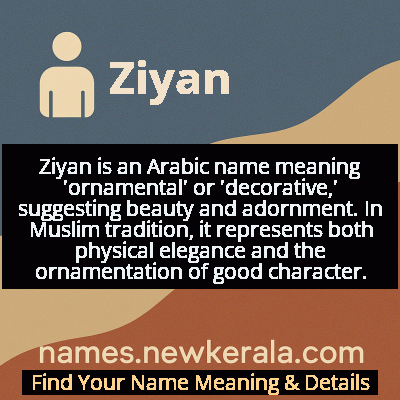Ziyan Name Meaning & Details
Origin, Popularity, Numerology Analysis & Name Meaning of Ziyan
Discover the origin, meaning, and cultural significance of the name ZIYAN. Delve into its historical roots and explore the lasting impact it has had on communities and traditions.
Name
Ziyan
Gender
Male
Origin
Muslim
Lucky Number
3
Meaning of the Name - Ziyan
Ziyan is an Arabic name meaning 'ornamental' or 'decorative,' suggesting beauty and adornment. In Muslim tradition, it represents both physical elegance and the ornamentation of good character.
Ziyan - Complete Numerology Analysis
Your Numerology Number
Based on Pythagorean Numerology System
Ruling Planet
Jupiter
Positive Nature
Optimistic, inspirational, and creative.
Negative Traits
Scattered, exaggerating.
Lucky Colours
Yellow, gold, purple.
Lucky Days
Thursday.
Lucky Stones
Yellow sapphire.
Harmony Numbers
1, 2, 9.
Best Suited Professions
Arts, writing, communication.
What People Like About You
Creativity, optimism.
Famous People Named Ziyan
Ziyan Shah
Religious Scholar
Prominent Islamic scholar known for his commentaries on Quranic exegesis
Ziyan Al-Mansur
Military Commander
Ottoman military leader renowned for his strategic innovations in cavalry tactics
Ziyan Hassan
Calligrapher
Master Islamic calligrapher whose works adorn several major mosques
Ziyan Abdullah
Academic
Professor of Islamic Studies at Al-Azhar University, author of influential texts on Islamic philosophy
Name Variations & International Equivalents
Click on blue names to explore their detailed meanings. Gray names with will be available soon.
Cultural & Historical Significance
Historically, the name has been favored among families with artistic or scholarly traditions, as it suggests refinement and cultural sophistication. The name's popularity spans various Muslim cultures, from the Middle East to Southeast Asia, demonstrating its cross-cultural appeal while maintaining its Islamic identity. In many communities, naming a child Ziyan expresses the parents' hope that the child will bring beauty and grace to the world while embodying the ornamental qualities of good character and refined manners that are highly valued in Islamic teachings.
Extended Personality Analysis
Individuals named Ziyan are often perceived as having an innate sense of aesthetics and refinement. They tend to be creative, artistic, and possess a natural elegance in their demeanor and approach to life. Their 'ornamental' nature manifests not just in physical appearance but in their ability to beautify their surroundings and relationships. Ziyans are typically diplomatic and tactful, understanding the importance of presentation and harmony in social interactions.
They often excel in fields requiring creativity and attention to detail, such as arts, design, or diplomacy. However, this ornamental quality can sometimes be misinterpreted as superficiality, when in reality, most Ziyans possess deep emotional intelligence and a strong sense of integrity. Their strength lies in their ability to balance aesthetic sensitivity with practical wisdom, making them excellent mediators and cultural ambassadors. They value beauty in all its forms but understand that true ornamentation comes from character and actions rather than mere appearance.
Modern Usage & Popularity
In contemporary times, Ziyan maintains steady popularity in Muslim communities worldwide, particularly in the Middle East, South Asia, and Southeast Asia. While not among the most common names, it enjoys consistent usage among families seeking names with cultural depth and aesthetic appeal. The name has seen a slight resurgence in recent years as parents look for traditional names with positive meanings that aren't overly common. In Western countries with Muslim populations, Ziyan serves as a bridge name - easily pronounceable while maintaining strong Islamic cultural roots. Digital globalization has also contributed to its spread, with the name appearing in international media and social platforms.
Symbolic & Spiritual Meanings
Symbolically, Ziyan represents the Islamic concept of 'ihsan' or excellence, where beauty and ornamentation are seen as manifestations of divine perfection. The name symbolizes the idea that human beings should strive to adorn their character with virtues just as they might adorn physical spaces. It carries connotations of refinement, elegance, and the transformative power of beauty in everyday life. In Sufi traditions, ornamental qualities are often associated with spiritual refinement and the polishing of the soul. The name also symbolizes balance - the harmony between outer beauty and inner virtue, between tradition and modernity, and between individual expression and cultural identity.

